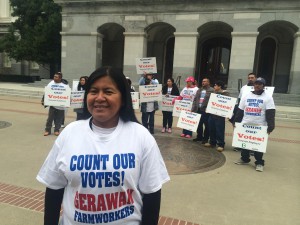Sacramento Superior Court Judge Timothy Frawley partially granted Gerawan Farming Company’s request for documents in an unfair labor practice complaint filed by the Agricultural Labor Relations Board. Frawley’s tentative ruling came out Thursday, prior to a court hearing Friday.
The tentative ruling is a win for Gerawan Farming and its employees. The court says that all communications between the ALRB and the General Counsel concerning the Temporary Restraining Order application authorization must be disclosed.
The ALRB General Counsel submitted a TRO packet to the Ag Labor Board on May 12, 2015, requesting permission to seek injunctive relief against Gerawan in Fresno Superior Court. The complaint against Gerawan was to try to force the farming company to rehire an employee suspended and later fired for insubordination. The ALRB document packet purportedly contained proof of malfeasance by Gerawan in unfairly suspending and discharging Mr. Marquez for engaging in protected pro-union activities.
Gerawan requested a copy of the TRO packet, the Board’s “conditional authorization” and any related communications from the Board under the California Public Records Act. Gerawan renewed its request on a number of occasions. The Board denied the request, claiming privilege, on May 26, 2015.
Judge Frawley’s ruling requires the ALRB to release documents in its request for a temporary restraining order against Gerawan.
ALRB Conflict of Interest
Since the TRO was filed, the ALRB’s General Counsel Sylvia Torres-Guillén and two Regional Directors – Silas Shawver and Alegría de la Cruz – have left the ALRB, or were forced out. All three were key players in the TRO, as well as many of the most contentious issues with Gerawan.
“At issue in this proceeding are records pertaining to the General Counsel’s request to file the TRO petition against Gerawan,” Judge Frawley wrote in his decision. “In particular, Gerawan seeks the “TRO packet” presented to the Board by the General Counsel, the Board’s letter granting “conditional authorization” to file the TRO petition, and documents relating to the “whistleblower claim” regarding the veracity of the declarations submitted to the Board. Although Gerawan is not required to identify the purpose of its request, Gerawan argues that it has a strong interest in these documents because of the “troubling issues” raised regarding the integrity of the ALRB’s investigation and the apparent embroilment of ALRB staff in the underlying dispute.”
“Here, an unfair labor practice case was commenced when Marquez and the United Farm Workers filed charges,” Frawley continued. (See 8 C.C.R. § 20720.) “From that point forward, the General Counsel (Torres-Guillen) assumed the role of ‘prosecutor’ in the case, and therefore could not simultaneously ‘advise’ the Board.”
Gerawan’s attorney wanted the documents supporting the restraining order request because they raised issues about the integrity of the ALRB’s investigation and the potential involvement of the board’s staff in the dispute, as evidenced by the judge’s comments.
The Whistleblower
“Gerawan had become aware of a whistleblower within the ALRB who alleged that the investigation leading up to the request for a temporary restraining order was marred by “vague and misleading” information,” the Fresno Bee reported. “The whistleblower also said that the board’s staff had become involved in the dispute by advising the employee to return to work despite having received a 10-day suspension.”
Gerawan’s attorneys filed a public records act request for documents related to the temporary restraining order. The ALRB denied the records request citing pending litigation.
But the judge didn’t buy their excuse. In his Thursday ruling, the judge said the ALRB failed to meet the burden of showing why the documents were exempt from disclosure. “Disclosing the documents will not, as the ALRB argues, invade the board’s legal privileges,” Frawley wrote in his decision.
There is no “legal privilege” – and no attorney-client privilege or work product privilege – as the ALRB General Counsel cannot be acting as the Board’s attorney in a prosecution before the Board. A judge and prosecutor cannot be in an attorney-client relationship.
“Gerawan and the public have a strong interest in the documents because they may shed light on the integrity of the ALRB’s investigation and the credibility of the ALRB’s evidence against Gerawan,” Judge Frawley wrote.
The Ringleaders
In the past three years I have written about and exposed General Counsel Silvia Torres Guillen’s close ties to the UFW and labor. She was a key speaker at the 2012 UFW 50 Year Anniversary celebration, promising to revive the UFW through forced contracts on Farmworkers. Only a few months later, in October 2012, the feeble union reappeared and insisted that a collective-bargaining agreement covering Gerawan workers be reactivated. The workers organized themselves and began the process to vote to decertify the labor union. The UFW, down to about 3,300 members from a high of 50,000 in the 1970s, narrowly won an election to represent the company’s workers 24 years ago. But after just one bargaining session and with no contract in place, the union disappeared and wasn’t heard from in more than two decades.
All of the ALRB Regional Directors involved in the Gerawan case had strong UFW and union ties: Alegria De La Cruz, a 3rd generation UFW activist, was hand picked for her ALRB post as Regional Director. Jessica Arciniega was a paid UFW Organizer and later UFW attorney. Silas Shawver was a union organizer for Unite Here. He was photographed wearing a UFW shirt, and had over a dozen social media “friends” who were UFW officials, organizers and activists.
There still is the business of the thousands of uncounted ballots from the Nov. 2013 decertification election in which the Gerawan workers voted to determine whether to keep or decertify the UFW as their labor representative. The ALRB and UFW want those ballots destroyed without ever being counted, and even convinced an ALRB Administrative Law Judge to order the ballots destroyed. These workers don’t want to be forced into a UFW contract that will seize three percent of their wages.




